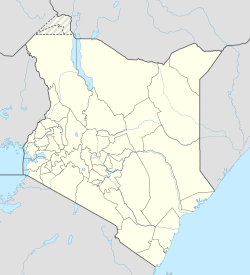It is proposed that this article be deleted because of the following concern:
If you can address this concern by improving, copyediting, sourcing, renaming, or merging the page, please edit this page and do so. You may remove this message if you improve the article or otherwise object to deletion for any reason. Although not required, you are encouraged to explain why you object to the deletion, either in your edit summary or on the talk page. If this template is removed, do not replace it. The article may be deleted if this message remains in place for seven days, i.e., after 21:47, 22 January 2025 (UTC). Find sources: "Ngombeni" – news · newspapers · books · scholar · JSTORPRODExpired+%5B%5BWP%3APROD%7CPROD%5D%5D%2C+concern+was%3A+No+significant+coverage+in+independent+reliable+sources+to+establish+%5B%5BWP%3AN%7Cnotability%5D%5D.Expired ], concern was: No significant coverage in independent reliable sources to establish notability. |
Another editor has reviewed this page's proposed deletion, endorses the proposal to delete, and adds:
If you remove the {{proposed deletion/dated}} tag above, please also remove this {{Proposed deletion endorsed}} tag. |
This article has multiple issues. Please help improve it or discuss these issues on the talk page. (Learn how and when to remove these messages)
|
| Ng'ombeni | |
|---|---|
 | |
| Coordinates: 4°08′S 39°37′E / 4.13°S 39.62°E / -4.13; 39.62 | |
| Country | Matuga |
| County | Kwale County |
| Time zone | UTC+3 (EAT) |
Ng'ombeni is a settlement in Kenya's Coast Province.It is a developing town as new business centers are established. Ng'ombeni is also an education center having Ng'ombeni Secondary School, Ng'ombeni Primary, Denyenye Primary, Zibani Primary, Kiteje Primary School, Ningawa Primary School, Waa Boys High School, Hekima Secondary School, and the private school Iqra Junior Academy. Government and Private sectors are looking at ways to fund and establish higher learning institutions and technical colleges in Ngombeni given the need for skilled labor in the rapidly developing county and the areas strategic location. A new carbro stone road project leading to an expanded road network at the primary school entrance makes it only minutes to the beach and access to Shelley Beach from the south.
Just off from the main highway, farming is still the main source of income and the government and the private sectors are helping local farmers improve their production capacities. Some of the places in Ng'ombeni include Mwachileli, Zibani, Ng'ombeni, Denyenye, Magaoni, Bara-arabu, Mwamoro, Mtakuja, Moshini and Ngong'o. The informal contract sector has also grown exponentially over the last 5 years given all the infrastructure and capital intensive projects in Ngombeni. This has resulted in the Per-Capital Income growth on average surpassing many other kwale towns and most of Kwale County areas. Several collective savings projects and increased consumer spending habits have seen a growth in retail and entertainment outlets. Recent affordable and high density housing development projects have been initiated.
Being strategically located on northern end of the south coast, the new Dongo Kundu by-pass will connect to the Mombasa Lunga-Lunga highway junctions at Ngombeni. The main highway at this junction has seen the expansion to four lanes. As a result, light industries, hotels, housing, and commercial interest in the area has risen consistently since 2018. With the construction of the new Mtongwe-Ganjoni bridge scheduled to replace the aging ferries in Likoni by 2024, traffic to the Economic Zones, Moi International Airport, and the Mombasa Island will only take minutes. Ngombeni is increasingly becoming a vital logistics center for the Kwale county. Several light industries have contributed significantly to employment and improving the living standards. Fresh water has been a main issue in this area, though, through the government of Kwale and Aid agencies, boreholes and rain catchment programs have helped reduce the shortages. It is also worth noting that Kwale County has a program currently in the works to provide running water once the gazette dams are completed. In addition, with the building of the new bridge to replace the ferries, many developers have started prospecting for commercial and residential land development in the whole vicinity.
Property developers and the government low income housing initiatives have started looking for opportunities in Likoni and Ngombeni to help easy the growing population and housing pressure experienced on the coast. Over the last five years, significant housing relocations (due to the by-pass) annexation, has shifted the need for more affordable and environmentally friendly construction. The cost of building such houses to current building codes is still challenging to the community at large though more suppliers of raw materials have sprung up to ease the demand and cement/stone manufacturing factories have ramped up production. To a greater extent, the beach front and sea cliff areas, since the COVID pandemic, have driven the started to spring up many touristic sites for both local and international demand since electricity is now available in most areas. The need for a major University in Kwale is pressing on the community at the moment.
The Kwale Development plan outlines the following developments (https://www.youthagenda.org/wp-content/uploads/2019/12/Kwale-County-Annual-Development-Plan-2018.pdf):
i) Investing quality, affordable and accessible health care services through establishment of a County Referral Hospital and upgrading the sub county hospitals, health centres and dispensaries. ii) Investing in key infrastructural facilities such as educational (ECDE and Youth Polytechnics), county access roads, water and sanitation systems, energy, markets and other for rapid economic transformation. iii) Investing in agricultural transformation and food security through increased extension services, agricultural mechanization, irrigation, livestock development and fisheries promotion. This will enhance food security, create employment, raise rural incomes and thus reduce poverty. iv) Working towards effective management of land and our natural resources, the physical planning of urban areas and trading centres and investing in land banking for infrastructural development. v) Investing in social welfare programmes for the women, youth and other vulnerable groups, human capital development programmes, trade promotion through offering of business capital and others. This will ensure inclusivity, equity and rapid economic development.